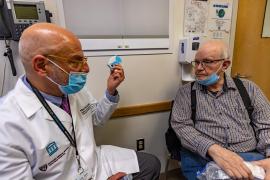CDC Recommends Every State Test All Prison Inmates With History of Injection Drug Use for Hepatitis C
The CDC on Thursday recommended that every state administer hepatitis C tests to all prison inmates who have a history of injection drug use, which is a common route for transmission of the virus, the Philadelphia Inquirer reports. The CDC also set guidelines for educating and treating prisoners with the virus and outlined the care prisons should provide to inmates with the disease. While the CDC cannot mandate policy for prisons, the agency can make recommendations that will influence how states "wrestle with the explosion" of hepatitis C in prisons. According to the CDC, the testing recommendations would "catch most cases" of hepatitis C among prison inmates. Of the estimated one million infected prisoners released annually, it is unknown how many have been informed of their hepatitis status; depending on the state, 16% to 41% of prisoners are infected. Of the approximately three million people with chronic hepatitis C in the United States, 39% will go through prisons and corrections facilities each year, putting the facilities "on the front lines for screening, counseling and treating the disease," according to the CDC. The agency did not recommend that entire prison populations be tested for the virus, an issue of "intense debate" because of the cost (Lin/Fazlollah, Philadelphia Inquirer, 1/24). New Jersey has estimated that a state program to pay for hepatitis C tests and treatment for prison inmates will cost between $4.5 million and $8 million this year (Kaiser Daily HIV/AIDS Report, 1/13). Pennsylvania estimates that its hepatitis C tests for more than 1,000 inmates will cost approximately $6 million. In addition, if inmates are screened for the virus, more are likely to qualify for medication; annual treatment can cure 50% of cases, but can cost up to $25,000 a year. Cindy Weinbaum, a CDC hepatitis specialist who prepared the recommendations, said that federal law requires states to treat sick inmates and that some prison officials argue that funds are not available for treatment, but she added that "[d]enying treatment that would be a standard of treatment on the outside would not be acceptable." The CDC next week will host a conference in San Antonio, Texas, to address management of hepatitis C in prisons (Philadelphia Inquirer, 1/24).
'Giant Incubators'
The New York Times today examines how jails and prisons are becoming "giant incubators" for several of the "worst infectious diseases." According to a CDC-sponsored study released today, at least 1.3 million people released from incarceration in 1996 were infected with hepatitis C, or 29% of the 4.5 million cases of hepatitis C nationwide. Further, the study estimated that newly released inmates accounted for 35% of the 34,000 Americans diagnosed with tuberculosis in 1996, and between 13% and 17% of all Americans infected with HIV/AIDS. "This is a public health problem that has been growing and growing, but we are reluctant to do anything about it because these are the bad guys," Dr. Robert Greifinger, author of the study and former chief medical officer for the New York state Department of Correctional Services, said. The study was commissioned by Congress and prepared for the Justice Department, according to the Times (Butterfield, New York Times, 1/28).






